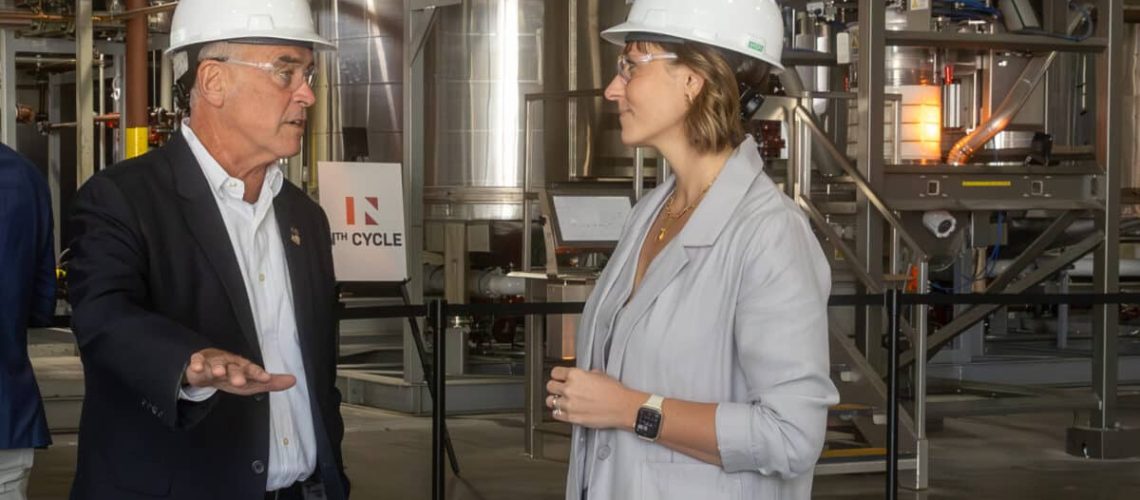The plant supplies critical metals for energy transition applications without using fossil fuels.
Boston-based startup Nth Cycle has cut the ribbon on its first commercial metals refining plant in Fairfield, Ohio. The 20,000 square foot facility houses the company’s proprietary Oyster electro-extraction system that refines nickel and cobalt from scrap materials. The metals are in demand for a broad range of renewable energy applications, particularly lithium-ion battery storage.
Unlike furnace-type recycling systems, the Oyster uses an electrochemical process to extract usable metals from scrap or ore. The process begins with shredded or powdered material supplied by the customer. The material is dissolved in a low-concentration acid bath and the desired metals are pulled from the solution using electricity. No fossil fuels are involved.
The Fairfield facility is designed to produce a mixed hydroxide precipitate (MHP) product containing concentrations of nickel and cobalt that are in demand for the lithium-ion battery supply chain. Nth Cycle says it is the only supplier of MHP in the United States. The Oyster process can be used to extract a number of critical metals, including lithium and manganese. The company is working on electro-extraction processes for other metals, including, crucially, copper.
Megan O’Connor, co-founder and CEO of Nth Cycle, told pv magazine USA that her company’s business model is to build Oyster processing systems on partner sites that provide the scrap materials or mined ore and want the target refined metals. In this sense, the Fairfield facility is more of a fully operational pilot in that it is standalone and owned by Nth Cycle. The location was chosen because there are a number of industries in the area that will provide scrap for the Oyster.
“For the customers we work with today, which are scrap recyclers and some OEMs who want us to refine the scrap-like material, most of them have huge lots,” O’Connor said. “So, we can either go into an existing structure or go right next door. Our partners already have permitting and grid interconnections for industrial activity. We typically fall within the same permits they already have and our power requirements are much less than for typical recycling operations.”
In addition, the Oyster process produces 90% fewer greenhouse gas emissions than mining operations and 44% less than traditional recycling methods. It takes about a year to set up an Oyster processing system, which is much less than a typical refinery. The company says an Oyster can produce about 3,100 metric tonnes (3,417 tons) of refined metal per year.
O’Connor said the Oyster process grew out of her graduate research in critical metals. Nth Cycle co-founder and chief scientist Chad Vecitis was working on an electro-extraction system for water purification. The two combined their work to focus on a means of developing sources of critical metals for the energy transition and other industries. Previously nearly 90% of refined critical metals come from China; there was no metal refining capacity in the U.S.
While the origins of the company go back seven years, the advent of the 2022 Inflation Reduction Act (IRA) has provided more impetus for Nth Cycle’s business because some provisions have domestic source requirements in order to receive credits for manufacturing. Nth Cycle also received a $7.2m 48C tax credit for its Ohio facility under the law’s Advanced Energy Project Tax Credit program.
“Regardless of any kind of support, whether it was through grants or tax credits, we knew that these materials were needed,” O’Connor said. “We think of the IRA is really like a cherry on top.”
The company expects to announce deals to deploy its electro-extraction system with other partners shortly.
So why Oyster? “It’s actually really a long acronym that’s a very, very technical way of saying we electrochemically extract materials,” O’Connor said. “But also, we’re headquartered just outside of Boston, and oysters pull lots of garbage and waste off the bottom of the sea to turn them into pearls. It was very fitting with who we are as a company.”




